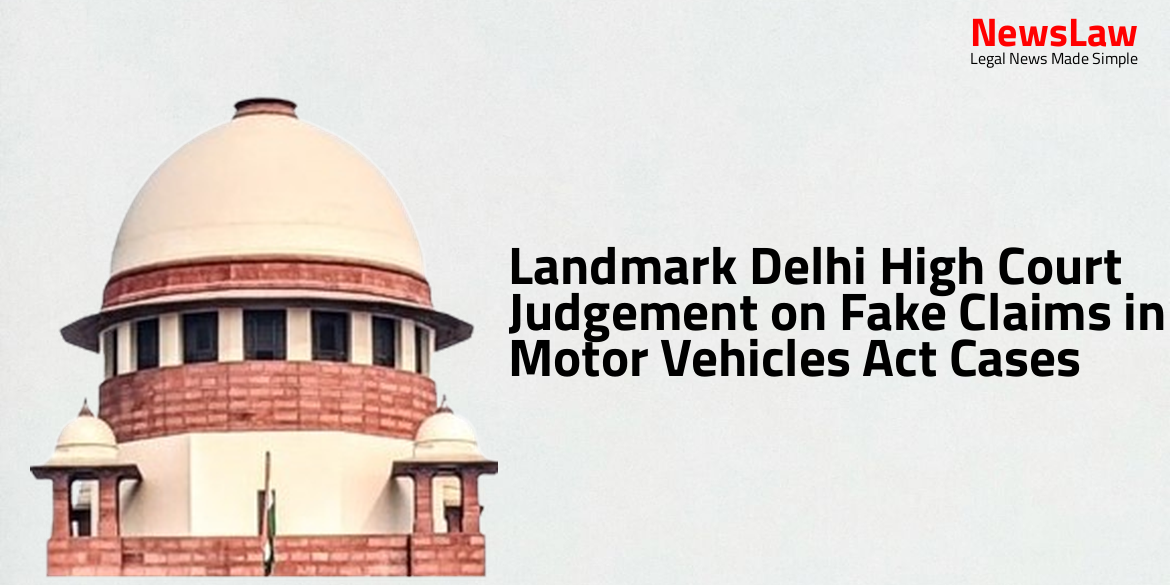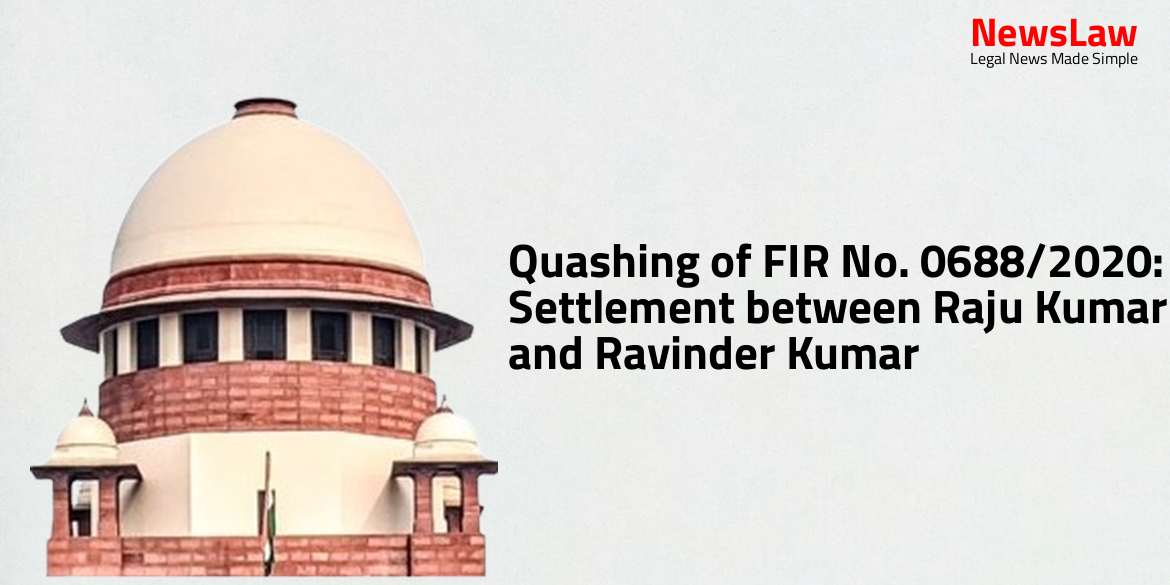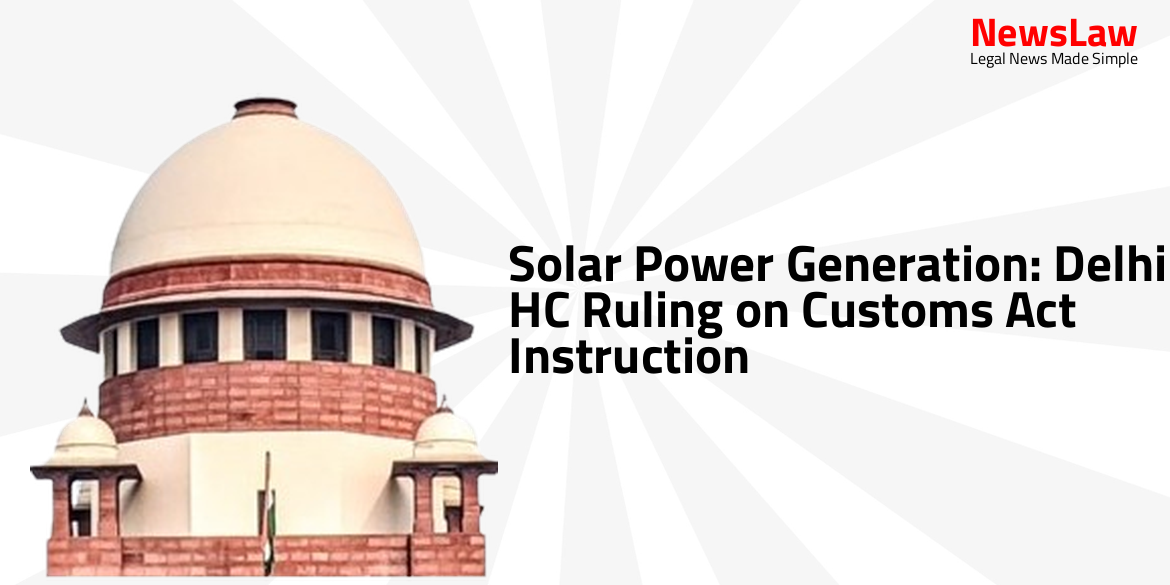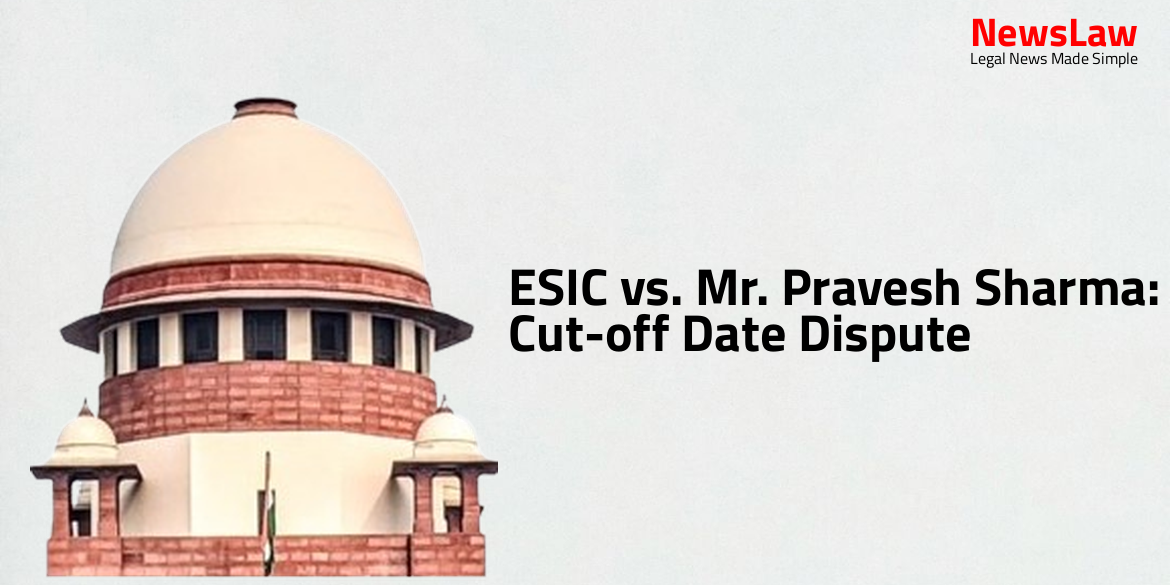In a significant ruling by the Delhi High Court, a case concerning fake claims under the Motor Vehicles Act has been thoroughly examined. The judgement sheds light on the alarming proliferation of fabricated cases, impacting the justice system. Stay tuned to discover the details of this crucial legal battle.
Facts
- The Hon’ble Supreme Court expressed serious concerns about the alarming situation of fake and fabricated claims being filed under the Motor Vehicles Act.
- Directions were issued to Registrars of all High Courts to ascertain doubtful cases that may require investigation to prevent filing of such fabricated cases.
- 64 fake claim cases were found pending in various Districts in the State of U.P., with compensation of Rs. 1.23 Crores paid in 29 cases and claims over Rs. 6 Crores still pending.
- The situation was deemed alarming, and similar scenarios were not ruled out in other States/Union Territories.
- The accident occurred on 13.07.2019, with the claim petition being filed on 22.04.2022, two years and eleven months after the accident.
- The bus was driven rashly, resulting in an over-turn after trying to overtake another vehicle, causing a fatality and grievous injuries to other passengers.
- The driver of the bus, Paramjit Singh, is a resident of VPO Jhanjoti, Tehsil Ajnala, Amritsar.
- The owner of the bus, Mangat Ram Mehta, is a resident of Village Gurha Singh Chak Shaman, Jammu.
- The office of the insurance company, Oriental Insurance Co. Ltd., is situated at Jammu180001.
- Advocates have been found filing petitions of outstation matters in bulk before different courts, sometimes stretching jurisdiction by citing the location of the insurance company.
- Malpractices in filing of fake claims led to the constitution of an SIT in Uttar Pradesh, resulting in the registration of 92 criminal cases in various districts.
- A case involving suspicious claims and accused persons was noted by the Supreme Court, with a total of 92 criminal cases registered after enquiry of 247 cases.
Arguments
- Non-road accident injury-death converted into road accident claims
- Fraudulent implantation of vehicle
- False implantation of driver
- Claimant implantation
- Multiple claims at various fora at different territorial locations for compensation from the same accident
- Filing claim applications before MACT Tribunals and authorities under Employees Compensation Act, 1923
- Fake/fabricated insurance policies
- Fake/fabricated income documents/medical documents for exaggerated compensation
Analysis
- The Claim Petition is dismissed due to being filed after two years and eleven months of the accident
- Important documents like certified copy of the charge-sheet, mechanical inspection report, and postmortem report have not been filed
- Adverse inference is drawn due to lack of information on compliance with Section 158(6) of Motor Vehicles Act
- The Tribunal did not allow the claimants to submit relevant certified copies of the criminal case against the driver
- There are suspicions regarding the correctness of the version presented before the Tribunal due to incomplete material and lack of crucial documents
- The police and Motor Accidents Claims Tribunals have not implemented the mandatory provisions of the Motor Vehicles Act.
- The Central Motor Vehicle Rules, 1989 prescribe the form (No.54) of the Police Report required under section 158(6) of the Act.
- The General Insurance Council v. State of A.P. case emphasized the need for implementing these provisions.
- All State Governments and Union Territories were directed to ensure compliance with Section 158(6) requirements under Rule 150 and Form 54 of the Central Motor Vehicles Rules, 1989.
- Periodical checking by the Inspector General of Police was mandated to ensure compliance.
- Non-compliance resulted in unscrupulous relatives, agents, and touts exploiting compensation amounts.
- The need for various measures, including immediate action against erring officials, was emphasized to protect accident victims and their families.
- Legislative changes aimed to reduce pendency and hasten compensation determination in accident claim cases.
- Specific provisions in the Motor Vehicles Act demanded prompt forwarding of accident information to Claims Tribunals and insurers.
- The Shafiq Ahmed v. ICICI Lombard General Insurance Co. Ltd. case highlighted fraud and fake claims in compensation petitions.
- The police are responsible for notifying the victim or their family and the driver, owner, and insurer of the first hearing date set by the Tribunal.
- Notification is crucial for all parties involved to ensure their presence at the hearing.
- This process helps keep all key stakeholders informed and involved in the legal proceedings.
- The timely notification allows for proper preparation and representation at the Tribunal.
- Each claimant submitted an affidavit stating they have not filed any petition elsewhere
- Claimants are permanent residents of Delhi, so there was no jurisdiction issue
- Non-compliance of Section 158(6) of MV Act by Investigating Officer does not prejudice the claimants
Decision
- The parties are directed to appear before the Tribunal on 03.06.2024 for further hearing.
- The revision petitions are to be submitted for necessary compliance.
- The order dated 2022 is set aside.
- No opinion on the merits of the case is expressed.
- Applicants/petitioners must submit all relevant documents by the next date of hearing.
- The matter is remanded back to the Tribunal for a fresh hearing and proceedings as per the law.
Case Title: HARISH GUPTA Vs. PARAMJIT SINGH & ORS. (2024:DHC:3951)
Case Number: C.R.P.-156/2022



